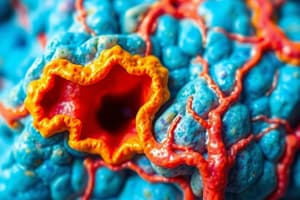Podcast
Questions and Answers
What is the main function of neurons?
What is the main function of neurons?
- Classifying connective tissue
- Producing connective tissue fibers
- Transmitting signals from one cell to another (correct)
- Providing support and protection for other cells
Which type of connective tissue fiber provides strength and elasticity?
Which type of connective tissue fiber provides strength and elasticity?
- Elastic (correct)
- Reticular
- Mesenchyme
- Collagen
What are the two main divisions of the nervous system?
What are the two main divisions of the nervous system?
- Proper and specialized
- Loose and dense
- Embryonic and mesenchyme
- Central and peripheral (correct)
Which type of connective tissue can be classified as specialized?
Which type of connective tissue can be classified as specialized?
Which tissue type consists of tightly packed sheets of cells that cover surfaces, such as the outer layer of the skin or the lining of the small intestine?
Which tissue type consists of tightly packed sheets of cells that cover surfaces, such as the outer layer of the skin or the lining of the small intestine?
What type of tissue underlies and supports other tissue types, and is made up of a ground substance and protein fibers like collagen, reticular, and elastic?
What type of tissue underlies and supports other tissue types, and is made up of a ground substance and protein fibers like collagen, reticular, and elastic?
Which tissue is essential for movement, maintaining posture, and pumping blood, and contains the proteins actin and myosin?
Which tissue is essential for movement, maintaining posture, and pumping blood, and contains the proteins actin and myosin?
What are the three main types of muscle tissue?
What are the three main types of muscle tissue?
Which type of connective tissue includes proper (dense, loose), embryonic (mesenchyme, mucous), and specialized (cartilage, adipose, bone, blood) categories?
Which type of connective tissue includes proper (dense, loose), embryonic (mesenchyme, mucous), and specialized (cartilage, adipose, bone, blood) categories?
What type of tissue consists of neurons and glial cells?
What type of tissue consists of neurons and glial cells?
Flashcards are hidden until you start studying
Study Notes
Tissue Types
Tissues are aggregates of cells that work together to perform specific functions in the body. There are four basic tissue types, each with distinct characteristics and functions:
-
Epithelial Tissue: This type of tissue consists of tightly packed sheets of cells that cover surfaces, such as the outer layer of the skin or the lining of the small intestine. Epithelial cells are polarized, meaning they have a top and a bottom side. The apical side of an epithelial cell faces the inside of a cavity or the outside of a structure, while the basal side connects to the underlying tissue.
-
Connective Tissue: Connective tissue underlies and supports other tissue types. It is made up of a ground substance and protein fibers, such as collagen, reticular, and elastic. There are three main types of connective tissue: proper (dense, loose), embryonic (mesenchyme, mucous), and specialized (cartilage, adipose, bone, blood).
-
Muscle Tissue: Muscle tissue is essential for movement, maintaining posture, and pumping blood. It contains the proteins actin and myosin, which allow muscle cells to contract. There are three main types of muscle tissue: skeletal muscle, cardiac muscle, and smooth muscle.
-
Nervous Tissue: Nervous tissue consists of neurons and glial cells. Neurons are specialized cells that transmit signals from one cell to another, while glial cells provide support and protection for neurons. The nervous system is divided into the central nervous system (CNS) and the peripheral nervous system (PNS).
Types of Fibers
Connective tissue is composed of various fibers that provide strength and elasticity. The main types of fibers found in connective tissue are:
- Collagen
- Reticular
- Elastic
Classification of Connective Tissue
Connective tissue can be classified into three broad types based on the composition of its extracellular matrix:
- Proper (dense, loose)
- Embryonic (mesenchyme, mucous)
- Specialized (cartilage, adipose, bone, blood)
In summary, tissues are essential components of the body's structure and function. Each type of tissue has unique characteristics and functions, with connective tissue playing a crucial role in supporting and connecting other tissues.
Studying That Suits You
Use AI to generate personalized quizzes and flashcards to suit your learning preferences.



